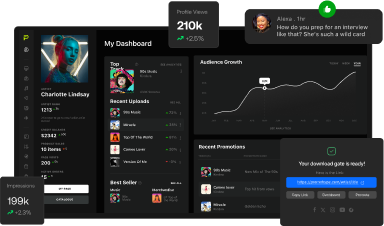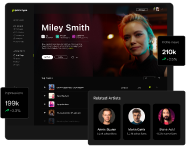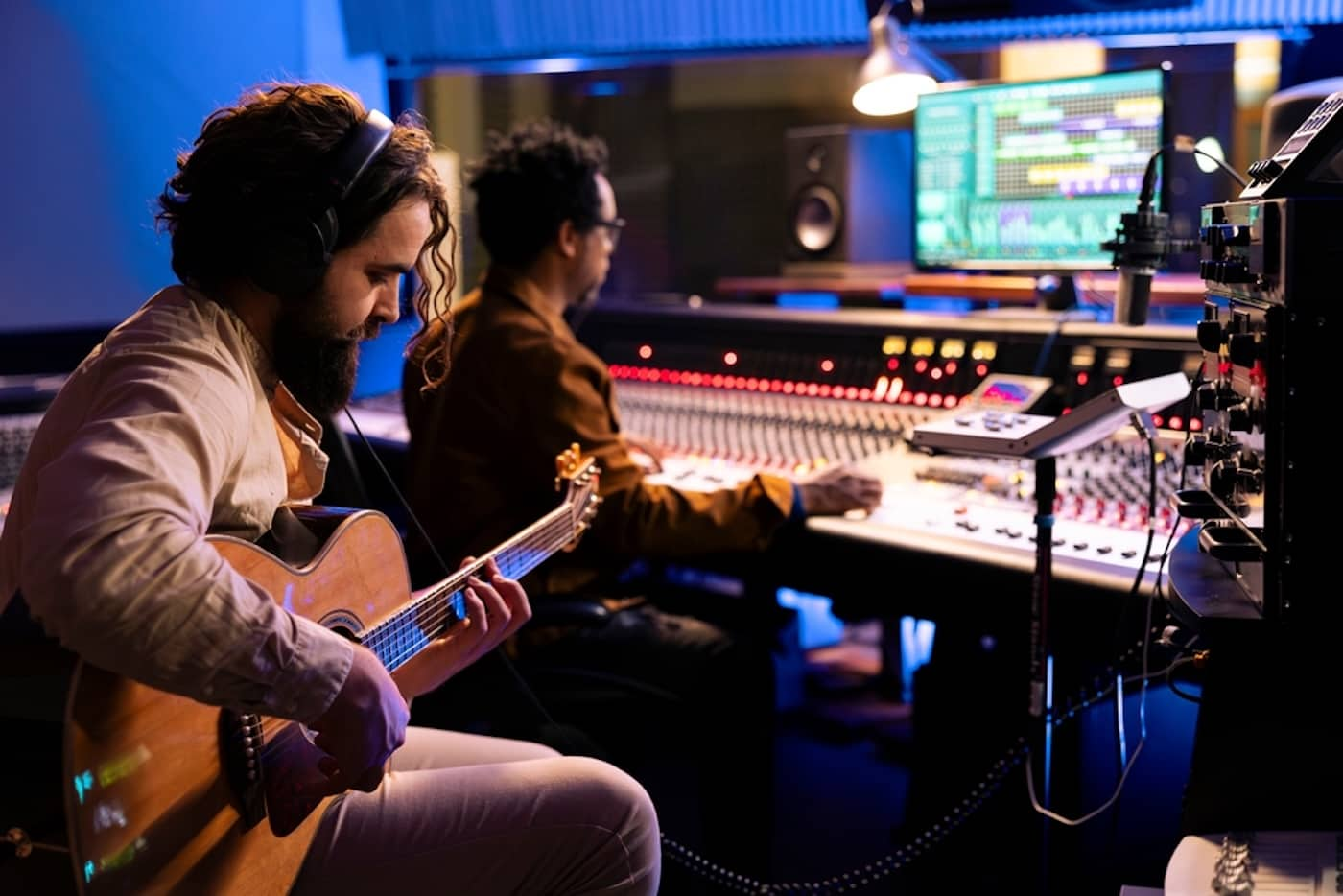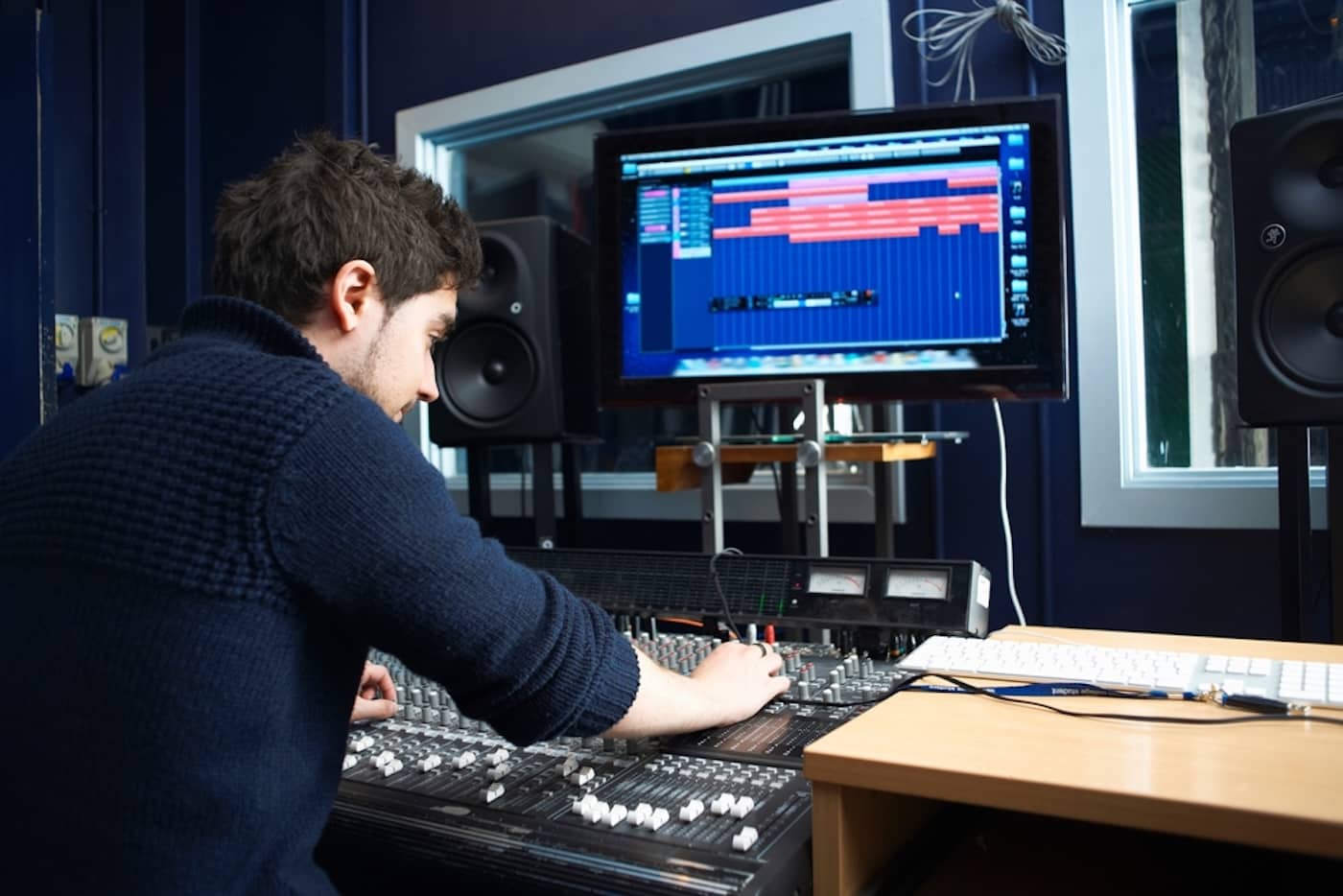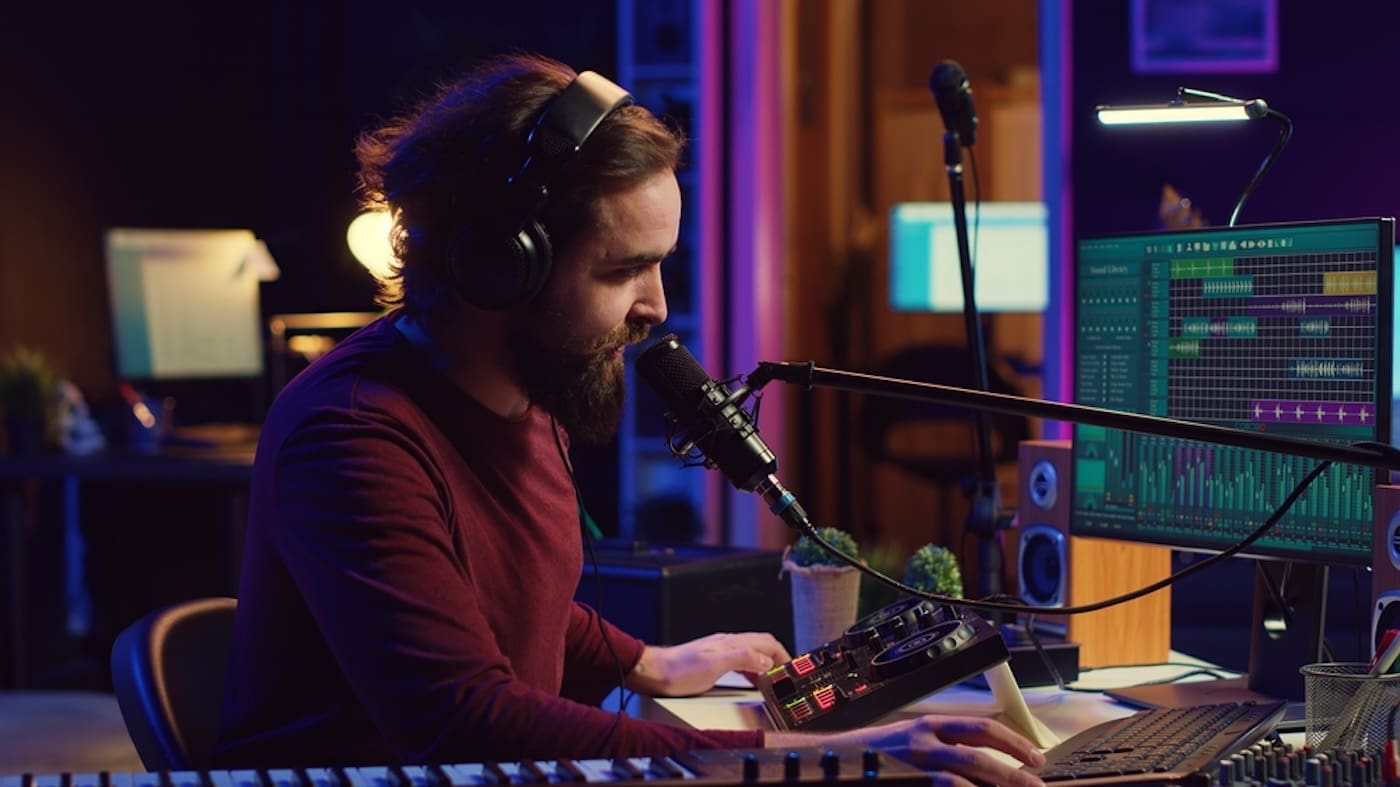
Mastering your songwriting and production skills can unlock endless opportunities in today’s music industry.
These talents not only fuel creativity but can also become powerful income streams.
From earning royalties and selling beats to creating exclusive content and collaborating with other artists, here’s how you can start making money with your music.
Get Early Access
To Promo Hype
Types Of Music Royalties
The music industry is enjoying a period of growth, with revenue from recorded and published music continuing to rise.
One of the most common ways to make money from music is through music royalties, which are paid out under various scenarios.
Various channels can be used for royalties, based on the music’s performance in public spaces or online streaming services.
Here’s an overview of performance and mechanical royalties, and how you can collect these when you stream and sell music:
Performance Royalties
As the name implies, performance royalties are generated whenever music is performed in a public place, such as a bar or restaurant.
Accessing this income requires registration with performing rights organizations, which monitor and distribute income to the relevant copyright holders.
This also includes online performances, such as plays on streaming platforms like Spotify, Apple Music, and TIDAL.
Mechanical Royalties
If you’re selling physical media in stores like Barnes & Noble, you’ll need to set up a system for collecting mechanical royalties.
In the United States, the Music Licensing Collective (MLC) is responsible for directing royalties to the correct recipients.
Both these types of royalties can be expanded to include print royalties, which are related to the sale of sheet music.
Related reading: Mechanical vs. performance royalties.
How To Make Money With Music In 2025: Top 10 Ideas
Earning money with music requires a diverse approach to revenue streams that maximize your discography.
Here are 10 reliable ways to make money with music, from streaming revenue and YouTube content to selling merchandise:
10. Sell Beats Online
Most music producers accumulate an extensive archive of individual percussion hits and loops over time.
These assets can be easily transformed into a source of income through online sales for use by other producers.
Throughout the process of making music, you can set aside a collection of beats that reflect your signature musical style.
These beats need to be of high quality, with the option for creating packs in varying styles to cater to different audiences.
You can use free VST plugins to explore different effects and build out an eclectic beats library ready to sell online.
Once you have a selection of beats to roll into a package, you can upload them to websites like Beatstars and begin promotional campaigns.
Ensure that your licensing fees and options are clearly outlined, including a distinction between leasing and exclusive licensing options.
If you have a professional website with e-commerce features, you can use this instead of third-party sites to maximize your profit margin.
9. Teach Other Music Producers
Online and in-person lessons are highly popular among aspiring songwriters and producers looking to develop their skills.
The scope for lesson plans is broad, ranging from a focus on a particular music genre, digital audio workstation, and teaching instruments.
It can also cover general educational topics related to music theory and introduce core concepts to students.
Lesson plans can be outlined to break down the skills and concepts into easy-to-digest packages complemented by quizzes.
If you know how to read sheet music, this skill can also be incorporated into your curriculum for those interested in learning.
For in-depth courses, you can upload video tutorials that students can pay to access on websites like Coursera and Udemy.
Alternatively, you can host these videos on your website, putting them behind a paywall to generate revenue streams when accessed.
There are several options for online live lessons, with the Superprof marketplace being popular for connecting students and educators.
If you have a home studio and don’t mind students visiting your residence, in-person lessons can give them practical experience.
8. Produce For Music Libraries
Library music, also known as production music, refers to music that’s specifically produced for a range of media outlets.
This includes television shows and movies, as well as video games, commercials, and other outlets where licensing is required.
If you have a talent for creating tracks on spec, you can start producing music intended for use on one of these media platforms.
This can be challenging, with high volumes of tracks required to fill a library, demonstrating an eclectic approach to production.
The ability to switch between genres and deliver content that meets client expectations is essential, as is maintaining high quality.
You should be proficient in using your digital audio workstation’s advanced features and have a basic understanding of audio compression.
As your experience develops, networking with music supervisors and other professionals will allow you to expand your client list.
While it can take time to establish a reputation, producing music for libraries can provide a consistent source of income.
Also read: The best digital audio workstations.
7. Sell Merchandise
Selling merchandise has long been a staple source of income for bands and music producers looking to develop their careers.
There are numerous band merchandising ideas to explore, with free design platforms like Canva available for creating stunning logos.
If you have professional design skills or can hire a designer, they can help create striking visual assets to use on your merch.
Once you’ve created a selection of designs, you can apply them to the following types of merchandise:
- Apparel: The most common type of merchandise used by bands and singer-songwriters is apparel, with hoodies and tees among the best sellers. You can expand your apparel range to include hats, caps, socks, and other clothing that’s suitable for your fan base.
- Accessories: Additional merchandise options, such as tote bags and smartphone cases, are other ways you can make money as a music producer. Music-related accessories, such as drumsticks and guitar picks with your logo embossed on the product, can also generate income.
- Posters and art prints: If you’ve created eye-catching album covers or have an upcoming tour, you can use these visual elements on posters and other visual media. You can also sell limited edition signed prints and posters to dedicated fans and collectors.
- Home goods: Mugs, tumblers, and other drinkware are popular merchandise options for many artists, along with other household items like candles and coasters. You can utilize print-on-demand services to eliminate manufacturing costs and ship directly to customers through a third-party vendor.
- Exclusive content packages: Mystery boxes are a great way to give fans something unique and fun, offering a curated selection of merchandise in one package. These can include exclusive products that aren’t available for sale elsewhere, such as signed tees and art prints.
With merchandise a growing business, it’s another tried-and-tested strategy for making money from your music.
6. Seek Out Brand Partnerships
The music industry has experienced a surge in brand partnerships in recent years, offering potentially lucrative ongoing revenue streams.
While brand partnerships are highly competitive, there are steps you can take to increase your chances of landing a deal.
This begins with building a robust online presence that attracts a dedicated audience, demonstrating your value to a brand partner.
Before approaching a brand, outline your experience and suitability, and share this information in an electronic press kit.
An EPK must include high-quality images and videos, along with a professional biography and samples of your best music.
You should also include performance metrics from your social media platforms, detailing your reach and engagement online.
Once your EPK is ready, create a shortlist of potential brand partnerships and brainstorm why you feel you’re a good fit.
You can then write dedicated pitches for each company, including this as a cover letter when sending out your EPKs.
Some brands offer artist programs, particularly music software and equipment brands that sell products and services to other producers.
Networking at music industry events, such as The NAMM Show, can also help you build contacts through face-to-face meetings.
If you’re hoping to get signed to a record label, you can also edit your EPK template to streamline the process.
5. Set Up A YouTube Channel
YouTube is another excellent platform for monetization, with the potential to generate multiple revenue streams through a channel.
Before you can monetize your channel, however, you’ll need to meet the eligibility threshold for the YouTube Partner Program.
The first tier unlocks access to shopping features and fan funding, while ad revenue is unlocked at the second tier.
In terms of channel content, the options are varied, from posting your latest music videos to sharing music production tips with fans.
If you have access to a recording studio, you can film sessions and explain how to record music for professional results.
YouTube content can generate additional income through brand partnerships and the creation of dedicated sponsored content.
Livestreaming can generate direct donations in the form of Super Chats, with additional gifts also available in vertical livestreams.
Your YouTube content should be tied into other revenue streams, promoting merch, tutorials, and new music releases.
If you’re using Patreon or other crowdfunding platforms, providing links to these in each video description is a must.
Get Early Access
To Promo Hype
4. Look For Sync Deals
Landing sync deals is closely associated with music publishing and building connections for high-tier projects.
While working with a publisher is beneficial, independent artists with a track record can still consider this option.
The process involves reaching out to sync agencies and requesting a commission through a professional pitch.
This pitch should outline why you believe your track is a perfect fit for their project, using language that is both descriptive and persuasive.
Take the time to research the past work of your potential supervisors, connecting with them on LinkedIn and other relevant platforms.
Websites like IMDb and Tunefind are also excellent resources for verifying previous projects that align with your musical style.
There’s some crossover with approaching music libraries when seeking out sync deals, and combining both can be advantageous.
If you’re producing tracks for popular music genres, hip-hop, electronic dance music, and rock are all highly sought after.
3. Put On Live Performances
While selling music and hosting on streaming platforms is a reliable way to earn money, live performances are also essential.
Many independent artists use their live gigs to generate additional income at the venue through various sources.
The most obvious method is to set up a stall and sell merchandise directly to fans during the event.
This can include tour-based branded clothing, physical media of your latest releases, and small items such as keychains and pins.
This merch is an excellent way to promote your music long after the gig has ended, building word of mouth from your audience.
Additional ways to make money through live performances include:
- Hosting private events, such as birthdays or corporate gatherings, or organizing intimate concerts like house concerts.
- Collaborating with other artists for a fully-fledged roster at an all-night gig or local festival.
- Taking bookings for college student events, including one-off parties and prom night performances.
- Registering with a Performing Rights Organization (PRO) and gathering live performance royalties for your music.
- Recording and releasing live albums of special events to complement your studio-recorded releases.
If you’re struggling to get gigs as a musician, consider partnering with other local artists and co-hosting events in your area.
Discover more: How to get signed to a record label.
2. Sell Physical Media
In an era of digital content, there’s been a decline in the number of people consuming music through physical media.
This doesn’t mean physical media should be overlooked, as there is a sizable market for CDs and vinyl records for monetizing your music.
Physical media is particularly prominent in niche genres, with fans of rock and underground dance music eager for collectible editions.
You can satisfy this demand by producing limited-edition EPs, singles, and albums, gauging sales figures for future releases.
Platforms like Bandcamp enable artists to connect directly with fans, offering both physical media and digital downloads for sale.
You can also ask local record shops if they’re willing to stock copies of your releases on a consignment basis.
If you’re seeking inspiration, the best music producers offer a range of deluxe box sets and limited-edition releases to reference.
Websites like Discogs, which sell rare and exclusive records, are also handy resources when designing physical packaging.
1. Earn Royalties Through Streaming Services
The most reliable source of revenue for modern producers is through streaming platforms, which generate ongoing royalties.
Spotify, Apple Music, Amazon Music, and TIDAL all offer royalties for featured artists, albeit with variable rates.
Managing multiple accounts on streaming platforms can be time-consuming, but music distribution services can streamline the process.
Through a monthly subscription fee, these services manage cross-platform uploads and include powerful scheduling tools.
They also provide detailed performance metrics that enable artists to focus their promotions on the most effective streaming services.
It’s an essential source of revenue, whether you’re a recording artist or producer looking to develop a music career.
Read this next: Music marketing guide.
Resources For Independent Artists
Planning and implementing monetization strategies can be simplified with the help of a range of resources and tools.
Here are some handy resources you can use when setting up revenue streams for your music productions:
- Digital music distribution services: Managing uploads and tracking performance on multiple streaming platforms can be time-consuming. By using a music distribution service, these processes can be managed externally, providing in-depth data analytics.
- Free design tools: Creating brand elements, such as logos, can be done using a range of free design tools, including Canva and GIMP. These assets can then be used for band and artist merchandise, as well as promotional materials for gigs.
- Online tutorials and courses: If you’re interested in selling educational materials, you’ll need to perfect multiple techniques. The best online music production courses encompass music theory, advanced production techniques, and a variety of other relevant topics.
- Social media scheduling tools: Managing promotions across multiple social media platforms can be challenging, but tools like Hootsuite can schedule posts in advance.
- Video editing software: If you’re working with visual media, free video editing software can be used for editing YouTube videos and music videos. You can also utilize advanced programs, with DaVinci Resolve’s free version offering features such as color grading and motion graphics.
- Music grants: Many independent artists are eligible to apply for music grants to support their efforts. This can be invested in music equipment and instruments for more professional-sounding productions.
By automating schedules using free tools, you can take a hands-off approach to monetization and focus on making awesome music.
Summary
Understanding how to make money with music starts with knowing the different monetization paths available to independent artists.
By combining multiple revenue streams, you can create a stable and scalable income instead of relying on a single source.
Track your performance, analyze what works, and focus your marketing efforts where they’ll generate the greatest impact.
Get Early Access
To Promo Hype
Join Promo Hype
